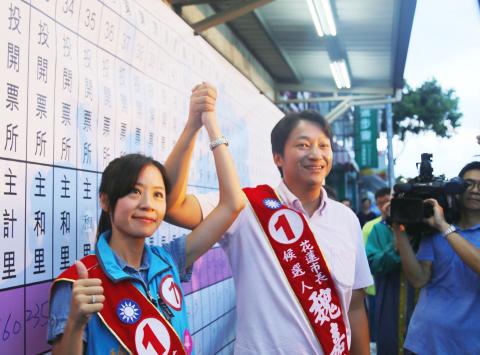Chinese Nationalist Party (KMT) candidate Wei Chia-hsien (魏嘉賢) yesterday won the Hualien City mayoral by-election, overthrowing the Democratic Progressive Party’s (DPP) rule of the city.
Wei won the by-election against his DPP opponent, Chang Mei-hui (張美慧), by a comfortable margin, with 17,923 votes to 13,958.
Wei secured 54.17 percent of the vote against Chang’s 42.18 percent, with a voter turnout of 40.87 percent.

Photo: Wang Chun-chi, Taipei Times
Wei declared victory about 80 minutes after ballot counting began at 4pm, thanking supporters in an emotional speech.
“I will dedicate myself over the next two years and four months. I will prove myself to voters,” Wei said. “I will serve all residents with utmost sincerity to make Hualien a city of warmth, a city that residents can be proud of.”
KMT Secretary-General Mo Tien-hu (莫天虎) expressed gratitude to voters at a post-election news conference, saying the KMT’s victory was an indicator of the public’s feelings toward the DPP government.
KMT Culture and Communications Committee director Chow Chi-wai (周志偉) said the fact that Wei was able to win the election, despite the DPP’s “mudslinging and use of government resources” during the campaign, indicated that the public was dissatisfied with the DPP government.
“The DPP has to learn its lesson from the election’s result. Its control of the legislature and the central government does not allow it to abuse its power,” Chow said.
“If the DPP cannot refrain from ideological manipulation or the fanning of populist sentiment in hunting down the KMT, it will suffer more defeats in coming elections,” Chow said.
Chang congratulated Wei and encouraged him to continue late Hualien Mayor Tien Chih-hsuan’s (田智宣) unfinished work to improve residents’ well-being.
“Although I lost the election, I will serve the city in any capacity to continue Tien’s legacy,” Chang said.
Chang was the wife of Tien, who died of lung cancer on May 29. The by-election was held to fill the opening left by his death.
Tien won the Hualien mayoral election in 2014 with 62.15 percent of the vote.
DPP spokesman Wang Min-sheng (王閔生) said the party humbly accepted the defeat and congratulated Wei on his victory.
“Although the election’s result is disappointing, the DPP will not depart from its ideals of integrity and diligence, and it will continue to carry out reform in Hualien,” Wang said.
Yesterday’s by-election was the second local election since President Tsai Ing-wen (蔡英文) assumed office on May 20.
A by-election for mayor of Changhua County’s Tianwei Township (田尾) was held on July 23, which the incumbent KMT won.

CHAOS: Iranians took to the streets playing celebratory music after reports of Khamenei’s death on Saturday, while mourners also gathered in Tehran yesterday Iranian Supreme Leader Ayatollah Ali Khamenei was killed in a major attack on Iran launched by Israel and the US, throwing the future of the Islamic republic into doubt and raising the risk of regional instability. Iranian state television and the state-run IRNA news agency announced the 86-year-old’s death early yesterday. US President Donald Trump said it gave Iranians their “greatest chance” to “take back” their country. The announcements came after a joint US and Israeli aerial bombardment that targeted Iranian military and governmental sites. Trump said the “heavy and pinpoint bombing” would continue through the week or as long

TRUST: The KMT said it respected the US’ timing and considerations, and hoped it would continue to honor its commitments to helping Taiwan bolster its defenses and deterrence US President Donald Trump is delaying a multibillion-dollar arms sale to Taiwan to ensure his visit to Beijing is successful, a New York Times report said. The weapons sales package has stalled in the US Department of State, the report said, citing US officials it did not identify. The White House has told agencies not to push forward ahead of Trump’s meeting with Chinese President Xi Jinping (習近平), it said. The two last month held a phone call to discuss trade and geopolitical flashpoints ahead of the summit. Xi raised the Taiwan issue and urged the US to handle arms sales to

BIG SPENDERS: Foreign investors bought the most Taiwan equities since 2005, signaling confidence that an AI boom would continue to benefit chipmakers Taiwan Semiconductor Manufacturing Co’s (TSMC, 台積電) market capitalization swelled to US$2 trillion for the first time following a 4.25 percent rally in its American depositary receipts (ADR) overnight, putting the world’s biggest contract chipmaker sixth on the list of the world’s biggest companies by market capitalization, just behind Amazon.com Inc. The site CompaniesMarketcap.com ranked TSMC ahead of Saudi Aramco and Meta Platforms Inc. The Taiwanese company’s ADRs on Tuesday surged to US$385.75 on the New York Stock Exchange, as strong demand for artificial intelligence (AI) applications led to chip supply constraints and boost revenue growth to record-breaking levels. Each TSMC ADR represents

State-run CPC Corp, Taiwan (CPC, 台灣中油) yesterday said that it had confirmed on Saturday night with its liquefied natural gas (LNG) and crude oil suppliers that shipments are proceeding as scheduled and that domestic supplies remain unaffected. The CPC yesterday announced the gasoline and diesel prices will rise by NT$0.2 and NT$0.4 per liter, respectively, starting Monday, citing Middle East tensions and blizzards in the eastern United States. CPC also iterated it has been reducing the proportion of crude oil imports from the Middle East and diversifying its supply sources in the past few years in response to geopolitical risks, expanding